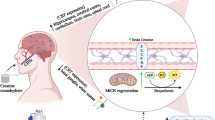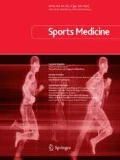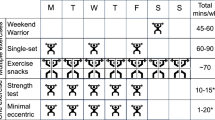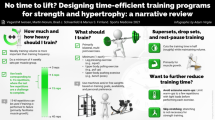Abstract
In the last few years, a plethora of studies have explored the effects of caffeine on resistance exercise, demonstrating that this field of research is growing fast. This review evaluates and summarizes the most recent findings. Given that toxic doses of caffeine are needed to increase skeletal muscle contractility, the binding of caffeine to adenosine receptors is likely the primary mechanism for caffeine’s ergogenic effects on resistance exercise. There is convincing evidence that caffeine ingestion is ergogenic for (i) one-repetition maximum, isometric, and isokinetic strength; and (ii) muscular endurance, velocity, and power in different resistance exercises, loads, and set protocols. Furthermore, there is some evidence that caffeine supplementation also may enhance adaptations to resistance training, such as gains in strength and power. Caffeine ingestion is ergogenic for resistance exercise performance in females, and the magnitude of these effects seems to be similar to that observed in men. Habitual caffeine intake and polymorphisms within CYP1A2 and ADORA2A do not seem to modulate caffeine’s ergogenic effects on resistance exercise. Consuming lower doses of caffeine (e.g., 2–3 mg/kg) appears to be comparably ergogenic to consuming high doses of caffeine (e.g., 6 mg/kg). Minimal effective doses of caffeine seem to be around 1.5 mg/kg. Alternate caffeine sources such as caffeinated chewing gum, gel, and coffee are also ergogenic for resistance exercise performance. With caffeine capsules, the optimal timing of ingestion seems to be 30–60 min before exercise. Caffeinated chewing gums and gels may enhance resistance exercise performance even when consumed 10 min before exercise. It appears that caffeine improves performance in resistance exercise primarily due to its physiological effects. Nevertheless, a small portion of the ergogenic effect of caffeine seems to be placebo-driven.
Similar content being viewed by others

References
Del Coso J, Muñoz G, Muñoz-Guerra J. Prevalence of caffeine use in elite athletes following its removal from the World Anti-Doping Agency list of banned substances. Appl Physiol Nutr Metab. 2011;36(4):555–61.
Aguilar-Navarro M, Muñoz G, Salinero JJ, Muñoz-Guerra J, Fernández-Álvarez M, Plata MDM, et al. Urine caffeine concentration in doping control samples from 2004 to 2015. Nutrients. 2019;11(2):286.
Grgic J, Grgic I, Pickering C, Schoenfeld BJ, Bishop DJ, Pedisic Z. Wake up and smell the coffee: caffeine supplementation and exercise performance—an umbrella review of 21 published meta-analyses. Br J Sports Med. 2020;54(11):681–8.
Grgic J, Mikulic P, Schoenfeld BJ, Bishop DJ, Pedisic Z. The influence of caffeine supplementation on resistance exercise: a review. Sports Med. 2019;49(1):17–30.
Blake MS, Johnson NR, Trautman KA, Grier JW, Stastny SN, Hackney KJ. Neither a multi-ingredient pre-workout supplement nor caffeine were effective at improving markers of blood flow or upper-body resistance exercise performance. Int J Exerc Sci. 2020;13(2):167–82.
Bowtell JL, Mohr M, Fulford J, Jackman SR, Ermidis G, Krustrup P, et al. Improved exercise tolerance with caffeine is associated with modulation of both peripheral and central neural processes in human participants. Front Nutr. 2018;5:6.
Castillo D, Domínguez R, Rodríguez-Fernández A, Raya-González J. Effects of caffeine supplementation on power performance in a flywheel device: a randomised, double-blind cross-over study. Nutrients. 2019;11(2):255.
Cesareo KR, Mason JR, Saracino PG, Morrissey MC, Ormsbee MJ. The effects of a caffeine-like supplement, TeaCrine®, on muscular strength, endurance and power performance in resistance-trained men. J Int Soc Sports Nutr. 2019;16(1):47.
Chen HY, Chen YC, Tung K, Chao HH, Wang HS. Effects of caffeine and sex on muscle performance and delayed-onset muscle soreness after exercise-induced muscle damage: a double-blind randomized trial. J Appl Physiol. 2019;127(3):798–805.
Costa GCT, Galvão L, Bottaro M, Mota JF, Pimentel GD, Gentil P. Effects of placebo on bench throw performance of paralympic weightlifting athletes: a pilot study. J Int Soc Sports Nutr. 2019;16(1):9.
De Salles Painelli V, Teixeira EL, Tardone B, Moreno M, Morandini J, Larrain VH, et al. Habitual caffeine consumption does not interfere with the acute caffeine supplementation effects on strength endurance and jumping performance in trained individuals. Int J Sport Nutr Exerc Metab. 2021 (in press).
Degrange T, Jackson W, Williams T, Rogers RR, Marshall M, Ballmann C. Acute caffeine ingestion increases velocity and power in upper and lower body free-weight resistance exercises. Int J Exerc Sci. 2019;12(2):1280–9.
Dittrich N, Serpa MC, Lemos EC, De Lucas RD, Guglielmo LGA. Effects of caffeine chewing gum on exercise tolerance and neuromuscular responses in well-trained runners. J Strength Cond Res. 2019. https://doi.org/10.1519/JSC.0000000000002966.
Ferreira TT, da Silva JVF, Bueno NB. Effects of caffeine supplementation on muscle endurance, maximum strength, and perceived exertion in adults submitted to strength training: a systematic review and meta-analyses. Crit Rev Food Sci Nutr. 2020. https://doi.org/10.1080/10408398.2020.1781051.
Filip-Stachnik A, Krzysztofik M, Kaszuba M, Leońska-Duniec A, Czarny W, Del Coso J, et al. Placebo effect of caffeine on maximal strength and strength endurance in healthy recreationally trained women habituated to caffeine. Nutrients. 2020;12(12):3813.
Franco-Alvarenga PE, Brietzke C, Canestri R, Goethel MF, Viana BF, Pires FO. Caffeine increased muscle endurance performance despite reduced cortical activation and unchanged neuromuscular efficiency and corticomuscular coherence. Nutrients. 2019;11(10):2471.
Giráldez-Costas V, González-García J, Lara B, Coso JD, Wilk M, Salinero JJ. Caffeine increases muscle performance during a bench press training session. J Hum Kinet. 2020;74:185–93.
Giráldez-Costas V, Ruíz-Moreno C, González-García J, Lara B, Del Coso J, Salinero JJ. Pre-exercise caffeine intake enhances bench press strength training adaptations. Front Nutr. 2021;8:622564.
Grgic J, Mikulic P. Acute effects of caffeine supplementation on resistance exercise, jumping, and Wingate performance: no influence of habitual caffeine intake. Eur J Sport Sci. 2020. https://doi.org/10.1080/17461391.2020.1817155.
Grgic J, Pickering C, Bishop DJ, Del Coso J, Schoenfeld BJ, Tinsley GM, et al. ADORA2A C allele carriers exhibit ergogenic responses to caffeine supplementation. Nutrients. 2020;12(3):741.
Grgic J, Pickering C, Bishop DJ, Schoenfeld BJ, Mikulic P, Pedisic Z. CYP1A2 genotype and acute effects of caffeine on resistance exercise, jumping, and sprinting performance. J Int Soc Sports Nutr. 2020;17(1):21.
Grgic J, Sabol F, Venier S, Mikulic I, Bratkovic N, Schoenfeld BJ, et al. What dose of caffeine to use: acute effects of 3 doses of caffeine on muscle endurance and strength. Int J Sports Physiol Perform. 2020;15(4):470–7.
Grgic J, Venier S, Schoenfeld BJ, Mikulic P. Caffeine ingestion enhances repetition velocity in resistance exercise: a randomized, crossover, double-blind study involving control and placebo conditions. J Hum Kinet. 2020;74:177–83.
Lane MT, Byrd MT. Effects of pre-workout supplements on power maintenance in lower body and upper body tasks. J Funct Morphol Kinesiol. 2018;3:11.
Harty PS, Zabriskie HA, Stecker RA, Currier BS, Tinsley GM, Surowiec K, et al. Caffeine timing improves lower-body muscular performance: a randomized trial. Front Nutr. 2020;7:585900.
Karayigit R, Naderi A, Akca F, Cruz CJGD, Sarshin A, Yasli BC, et al. Effects of different doses of caffeinated coffee on muscular endurance, cognitive performance, and cardiac autonomic modulation in caffeine naive female athletes. Nutrients. 2020;13(1):2.
Kirk BJC, Trajano GS, Pulverenti TS, Rowe G, Blazevich AJ. Neuromuscular factors contributing to reductions in muscle force after repeated, high-intensity muscular efforts. Front Physiol. 2019;10:783.
Lane MT, Byrd MT, Bell Z, Hurley T. Effects of supplementation of a pre-workout on power maintenance in lower body and upper body tasks in women. J Funct Morphol Kinesiol. 2019;4(2):18.
Lattari E, Vieira LAF, Oliveira BRR, Unal G, Bikson M, de Mello Pedreiro RC, et al. Effects of transcranial direct current stimulation with caffeine intake on muscular strength and perceived exertion. J Strength Cond Res. 2019;33(5):1237–43.
Lopes-Silva JP, Rocha ALSD, Rocha JCC, Silva VFDS, Correia-Oliveira CR. Caffeine ingestion increases the upper-body intermittent dynamic strength endurance performance of combat sports athletes. Eur J Sport Sci. 2021. https://doi.org/10.1080/17461391.2021.1874058.
Muñoz A, López-Samanes Á, Aguilar-Navarro M, Varillas-Delgado D, Rivilla-García J, Moreno-Pérez V, et al. Effects of CYP1A2 and ADORA2A genotypes on the ergogenic response to caffeine in professional handball players. Genes. 2020;11(8):933.
Muñoz A, López-Samanes Á, Pérez-López A, Aguilar-Navarro M, Moreno-Heredero B, Rivilla-García J, et al. Effects of caffeine ingestion on physical performance in elite women handball players: a randomized, controlled study. Int J Sports Physiol Perform. 2020. https://doi.org/10.1123/ijspp.2019-0847.
Neyroud D, Cheng AJ, Donnelly C, Bourdillon N, Gassner AL, Geiser L, et al. Toxic doses of caffeine are needed to increase skeletal muscle contractility. Am J Physiol Cell Physiol. 2019;316(2):C246–51.
Nicks CR, Martin EH. Effects of caffeine on inspiratory muscle function. Eur J Sport Sci. 2020;20(6):813–8.
Norum M, Risvang LC, Bjørnsen T, Dimitriou L, Rønning PO, Bjørgen M, et al. Caffeine increases strength and power performance in resistance-trained females during early follicular phase. Scand J Med Sci Sports. 2020;30(11):2116–29.
Pereira PEA, Azevedo P, Azevedo K, Azevedo W, Machado M. Caffeine supplementation or carbohydrate mouth rinse improves performance. Int J Sports Med. 2021;42(2):147–52.
Peterson BM, Brown LE, Judelson DA, Gallo-Rebert S, Coburn JW. Caffeine increases rate of torque development without affecting maximal torque. J Sci Sport Exerc. 2019;1:248–56.
Polito MD, Grandolfi K, de Souza DB. Caffeine and resistance exercise: the effects of two caffeine doses and the influence of individual perception of caffeine. Eur J Sport Sci. 2019;19(10):1342–8.
Raya-González J, Rendo-Urteaga T, Domínguez R, Castillo D, Rodríguez-Fernández A, Grgic J. Acute effects of caffeine supplementation on movement velocity in resistance exercise: a systematic review and meta-analysis. Sports Med. 2020;50(4):717–29.
Romero-Moraleda B, Del Coso J, Gutiérrez-Hellín J, Lara B. The effect of caffeine on the velocity of half-squat exercise during the menstrual cycle: a randomized controlled trial. Nutrients. 2019;11(11):2662.
Salatto RW, Arevalo JA, Brown LE, Wiersma LD, Coburn JW. Caffeine’s effects on an upper-body resistance exercise workout. J Strength Cond Res. 2020;34(6):1643–8.
San Juan AF, López-Samanes Á, Jodra P, Valenzuela PL, Rueda J, Veiga-Herreros P, et al. Caffeine supplementation improves anaerobic performance and neuromuscular efficiency and fatigue in olympic-level boxers. Nutrients. 2019;11(9):2120.
Santos-Mariano AC, Tomazini F, Felippe LC, Boari D, Bertuzzi R, De-Oliveira FR, et al. Effect of caffeine on neuromuscular function following eccentric-based exercise. PLoS ONE. 2019;14(11):e0224794.
Souza DB, Duncan M, Polito MD. Improvement of lower-body resistance-exercise performance with blood-flow restriction following acute caffeine intake. Int J Sports Physiol Perform. 2019;14(2):216–21.
Spineli H, Pinto MP, Dos Santos BP, Lima-Silva AE, Bertuzzi R, Gitaí DLG, et al. Caffeine improves various aspects of athletic performance in adolescents independent of their 163 C > A CYP1A2 genotypes. Scand J Med Sci Sports. 2020;30(10):1869–77.
Venier S, Grgic J, Mikulic P. Acute enhancement of jump performance, muscle strength, and power in resistance-trained men after consumption of caffeinated chewing gum. Int J Sports Physiol Perform. 2019;14(10):1415–21.
Venier S, Grgic J, Mikulic P. Caffeinated gel ingestion enhances jump performance, muscle strength, and power in trained men. Nutrients. 2019;11(4):937.
Waer FB, Laatar R, Jouira G, Srihi S, Rebai H, Sahli S. Functional and cognitive responses to caffeine intake in middle-aged women are dose depending. Behav Brain Res. 2021;397:112956.
Waller G, Dolby M, Steele J, Fisher JP. A low caffeine dose improves maximal strength, but not relative muscular endurance in either heavier-or lighter-loads, or perceptions of effort or discomfort at task failure in females. PeerJ. 2020;8:e9144.
Wilk M, Filip A, Krzysztofik M, Gepfert M, Zajac A, Del Coso J. Acute caffeine intake enhances mean power output and bar velocity during the bench press throw in athletes habituated to caffeine. Nutrients. 2020;12(2):406.
Wilk M, Filip A, Krzysztofik M, Maszczyk A, Zajac A. The acute effect of various doses of caffeine on power output and velocity during the bench press exercise among athletes habitually using caffeine. Nutrients. 2019;11(7):1465.
Filip-Stachnik A, Wilk M, Krzysztofik M, Lulińska E, Tufano JJ, Zajac A, et al. The effects of different doses of caffeine on maximal strength and strength-endurance in women habituated to caffeine. J Int Soc Sports Nutr. 2021;18(1):25.
Wilk M, Krzysztofik M, Filip A, Zajac A, Del Coso J. Correction: Wilk et al. The effects of high doses of caffeine on maximal strength and muscular endurance in athletes habituated to caffeine. Nutrients. 2019;11(11):2660.
Wilk M, Krzysztofik M, Filip A, Zajac A, Del Coso J. The effects of high doses of caffeine on maximal strength and muscular endurance in athletes habituated to caffeine. Nutrients. 2019;11(8):1912.
Wilk M, Krzysztofik M, Maszczyk A, Chycki J, Zajac A. The acute effects of caffeine intake on time under tension and power generated during the bench press movement. J Int Soc Sports Nutr. 2019;16(1):8.
McLellan TM, Caldwell JA, Lieberman HR. A review of caffeine’s effects on cognitive, physical and occupational performance. Neurosci Biobehav Rev. 2016;71:294–312.
Aguiar AS Jr, Speck AE, Canas PM, Cunha RA. Neuronal adenosine A2A receptors signal ergogenic effects of caffeine. Sci Rep. 2020;10(1):13414.
Fredholm BB, Bättig K, Holmén J, Nehlig A, Zvartau EE. Actions of caffeine in the brain with special reference to factors that contribute to its widespread use. Pharmacol Rev. 1999;51:83–133.
Tallis J, Duncan MJ, James RS. What can isolated skeletal muscle experiments tell us about the effects of caffeine on exercise performance? Br J Pharmacol. 2015;172(15):3703–13.
Allen DG, Westerblad H. The effects of caffeine on intracellular calcium, force and the rate of relaxation of mouse skeletal muscle. J Physiol. 1995;487(Pt 2):331–42.
Fryer MW, Neering IR. Actions of caffeine on fast- and slow-twitch muscles of the rat. J Physiol. 1989;416:435–54.
des Georges A, Clarke OB, Zalk R, Yuan Q, Condon KJ, Grassucci RA, et al. Structural basis for gating and activation of RyR1. Cell. 2016;167:145–57.e17.
Arazi H, Dehlavinejad N, Gholizadeh R. The acute effect of caffeine supplementation on strength, repetition sustainability and work volume of novice bodybuilders. Turk J Kinesiol. 2016;2(3):43–8.
Arazi H, Hoseinihaji M, Eghbali E. The effects of different doses of caffeine on performance, rating of perceived exertion and pain perception in teenagers female karate athletes. Braz J Pharm Sci. 2016;52(4):685–92.
Farney TM, Nelson AG, Kokkonen J. Caffeine, acute static stretching and maximum knee flexion strength. J Sports Med Phys Fit. 2019;59(2):223–9.
Warren GL, Park ND, Maresca RD, McKibans KI, Millard-Stafford ML. Effect of caffeine ingestion on muscular strength and endurance: a meta-analysis. Med Sci Sports Exerc. 2010;42(7):1375–87.
Grgic J, Pickering C. The effects of caffeine ingestion on isokinetic muscular strength: a meta-analysis. J Sci Med Sport. 2019;22(3):353–60.
Wilson GJ, Murphy AJ. The use of isometric tests of muscular function in athletic assessment. Sports Med. 1996;22(1):19–37.
Williams AD, Cribb PJ, Cooke MB, Hayes A. The effect of ephedra and caffeine on maximal strength and power in resistance-trained athletes. J Strength Cond Res. 2008;22(2):464–70.
Rahimi R. The effect of CYP1A2 genotype on the ergogenic properties of caffeine during resistance exercise: a randomized, double-blind, placebo-controlled, crossover study. Ir J Med Sci. 2019;188(1):337–45.
Pareja-Blanco F, Rodríguez-Rosell D, Sánchez-Medina L, Sanchis-Moysi J, Dorado C, Mora-Custodio R, et al. Effects of velocity loss during resistance training on athletic performance, strength gains and muscle adaptations. Scand J Med Sci Sports. 2017;27(7):724–35.
Galiano C, Pareja-Blanco F, Hidalgo de Mora J, Sáez de Villarreal E. Low-velocity loss induces similar strength gains to moderate-velocity loss during resistance training. J Strength Cond Res. 2020. https://doi.org/10.1519/JSC.0000000000003487.
Pallarés JG, Fernández-Elías VE, Ortega JF, Muñoz G, Muñoz-Guerra J, Mora-Rodríguez R. Neuromuscular responses to incremental caffeine doses: performance and side effects. Med Sci Sports Exerc. 2013;45(11):2184–92.
Grgic J, Trexler ET, Lazinica B, Pedisic Z. Effects of caffeine intake on muscle strength and power: a systematic review and meta-analysis. J Int Soc Sports Nutr. 2018;15:11.
Polito MD, Souza DA, Casonatto J, Farinatti P. Acute effect of caffeine consumption on isotonic muscular strength and endurance: a systematic review and meta-analysis. Sci Sport. 2016;31(3):119–28.
Kemp JG, Eaton T, Jarvis S, Meehan D, Olcina G, Whyte DG. Caffeine improves strength gains in response to 6 weeks of resistance training. J Aus Strength Cond. 2013;20(1):48–50.
Alkhatib A, Hsieh MJ, Kuo CH, Hou CW. Caffeine optimizes HIIT benefits on obesity-associated metabolic adversity in women. Med Sci Sports Exerc. 2020;52(8):1793–800.
Ralston GW, Kilgore L, Wyatt FB, Baker JS. The effect of weekly set volume on strength gain: a meta-analysis. Sports Med. 2017;47(12):2585–601.
Schoenfeld BJ, Ogborn D, Krieger JW. Dose-response relationship between weekly resistance training volume and increases in muscle mass: a systematic review and meta-analysis. J Sports Sci. 2017;35(11):1073–82.
Salinero JJ, Lara B, Jiménez-Ormeño E, Romero-Moraleda B, Giráldez-Costas V, Baltazar-Martins G, et al. More research is necessary to establish the ergogenic effect of caffeine in female athletes. Nutrients. 2019;11(7):1600.
Chen HY, Wang HS, Tung K, Chao HH. Effects of gender difference and caffeine supplementation on anaerobic muscle performance. Int J Sports Med. 2015;36(12):974–8.
Lane JD, Steege JF, Rupp SL, Kuhn CM. Menstrual cycle effects on caffeine elimination in the human female. Eur J Clin Pharmacol. 1992;43(5):543–6.
Kamimori GH, Joubert A, Otterstetter R, Santaromana M, Eddington ND. The effect of the menstrual cycle on the pharmacokinetics of caffeine in normal, healthy eumenorrheic females. Eur J Clin Pharmacol. 1999;55(6):445–9.
Fredholm BB. Adenosine actions and adenosine receptors after 1 week treatment with caffeine. Acta Physiol Scand. 1982;115:283–6.
Bell DG, McLellan TM. Exercise endurance 1, 3, and 6 h after caffeine ingestion in caffeine users and nonusers. J Appl Physiol. 2002;93(4):1227–34.
Pickering C, Kiely J. What should we do about habitual caffeine use in athletes? Sports Med. 2019;49(6):833–42.
Filip A, Wilk M, Krzysztofik M, Del Coso J. Inconsistency in the ergogenic effect of caffeine in athletes who regularly consume caffeine: is it due to the disparity in the criteria that defines habitual caffeine intake? Nutrients. 2020;12(4):1087.
Pickering C, Kiely J. Are the current guidelines on caffeine use in sport optimal for everyone? Inter-individual variation in caffeine ergogenicity, and a move towards personalised sports nutrition. Sports Med. 2018;48(1):7–16.
Grgic J, Pickering C, Del Coso J, Schoenfeld BJ, Mikulic P. CYP1A2 genotype and acute ergogenic effects of caffeine intake on exercise performance: a systematic review. Eur J Nutr. 2021;60(3):1181–95.
Loy BD, O’Connor PJ, Lindheimer JB, Covert SF. Caffeine is ergogenic for adenosine A2A receptor gene (ADORA2A) T allele homozygotes: a pilot study. J Caffeine Res. 2015;5(2):73–81.
Del Coso J, Salinero JJ, González-Millán C, Abián-Vicén J, Pérez-González B. Dose response effects of a caffeine-containing energy drink on muscle performance: a repeated measures design. J Int Soc Sports Nutr. 2012;9(1):21.
Richardson DL, Clarke ND. Effect of coffee and caffeine ingestion on resistance exercise performance. J Strength Cond Res. 2016;30(10):2892–900.
Kamimori GH, Karyekar CS, Otterstetter R, Cox DS, Balkin TJ, Belenky GL, et al. The rate of absorption and relative bioavailability of caffeine administered in chewing gum versus capsules to normal healthy volunteers. Int J Pharm. 2002;234(1–2):159–67.
Marticorena FM, Carvalho A, de Oliveira LF, Dolan E, Gualano B, Swinton S, et al. Nonplacebo controls to determine the magnitude of ergogenic interventions: a systematic review and meta-analysis. Med Sci Sports Exerc. 2021. https://doi.org/10.1249/MSS.0000000000002635.
Author information
Authors and Affiliations
Corresponding author
Ethics declarations
Funding
No sources of funding were used to assist in the preparation of this article.
Conflict of interest
Jozo Grgic declares he has no conflicts of interest relevant to the content of this article.
Consent for publication
Not applicable.
Availability of data and materials
Not applicable.
Rights and permissions
About this article
Cite this article
Grgic, J. Effects of Caffeine on Resistance Exercise: A Review of Recent Research. Sports Med 51, 2281–2298 (2021). https://doi.org/10.1007/s40279-021-01521-x
Accepted:
Published:
Issue Date:
DOI: https://doi.org/10.1007/s40279-021-01521-x



